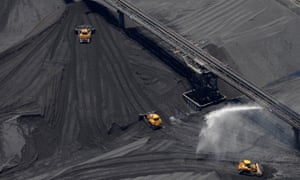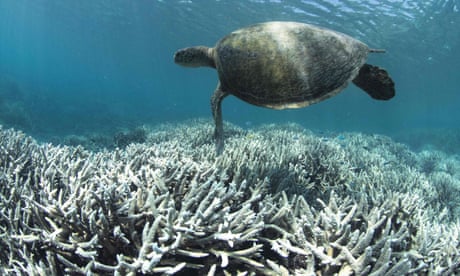Leadership forum hears of 'huge gap' between experts' advice on phasing carbon out of the economy and public willingness to go along with that advice
 |
| Policy experts at a leaders forum in Canberra say Australia will inevitably decarbonise its economy, and the sooner the better. Photograph: Dave Hunt/AAP |
They also say the public may not realise it but a carbon price has already been built into Australia's economy with the Turnbull government's decision, at the Paris climate conference last year, to reduce emissions to 26% to 28% on 2005 levels by 2030.
The Coalition and Labor must stick to that target, they say, so businesses can make the long-term investment decisions that will eventually see coal phased out of Australia's energy mix.
The Australian National University's leadership forum, held over Monday and Tuesday, convened talks on a range of topics, including the rise of mega-corporations, employment prospects in modern capitalism, and the likelihood of political reform in China.
But a session on energy and climate change heard policy experts venting frustration about the state of Australia's climate change debate.
The conversation was led by: Jennifer Westacott, the chief executive of the Business Council of Australia; Grant King, the managing director of Origin Energy; Frank Jotzo, the director of Climate Economics; Tania Constable, the chief executive of the Cooperative Research Centre for Greenhouse Gas Technologies.
The session also heard from economists David Gruen and Warwick McKibbin, the chair of the Clean Energy Finance Corporation, Jillian Broadbent, and the managing director of Australian Ethical Investment, Phil Vernon.
They agreed Australia would inevitably decarbonise its economy and it was in everyone's interest to do so sooner rather than later.
There was frustration about the gap between what they knew had to be done, and the public's willingness to accept certain instruments of climate change policy.
They said the public had been too easily spooked by politicians or the media rebranding the discussion of a carbon price – which the public says it wants – as a discussion about a carbon tax.
"Last time we had this discussion with the community, people were bewildered by this," Westacott said.
"So 60% of people said were saying they wanted a price on carbon until someone calls it something else, and then they don't like it.
"So how do we ... cross this divide?"
 Jotzo said Australia's experts had failed to convince voters about
the need to adapt to climate change because they were using technocratic
language.
Jotzo said Australia's experts had failed to convince voters about
the need to adapt to climate change because they were using technocratic
language.The discussion should start focusing on the reality of what adaptation would mean, he said, starting with an admission that Australia was taking the Paris agreement seriously which means "no more coal in the electricity sector".
"That's a major transition, and that is the debate that needs to be had with the Australian public," Jotzo said.
"It's not about the precise instruments – leave that to the technocrats. It's about the transition."
King said if the 26% to 28% target from Paris was bedded down, Australia would have a carbon price built into its economy whether the public knew it or not.
He hoped this would happen because it would start to phase out coal-fired power stations from the energy mix, a situation he was preparing for.
"No one's set a carbon price but they have set a carbon target," he said. "We just back-solve [from that] and say what's the cost of achieving that target? That's the implied carbon price.
"We are permitting and contracting and building utility-scale solar, because we think it's a very safe decision given all the costs ... [But] our risk is a political risk that the target doesn't stick.
"If we solve the 26 to 28% target and that sticks, if they have bipartisan political commitment at a minimum ... if we solve and we run forward our market-based models against that decision, coal will come out.
"And it has to come out because you cannot hit that 26-28% [target] without substitution of low-emission, effectively renewable [energy]. And when that happens coal economics deteriorate."
Ken Baldwin, director of ANU's Energy Change Institute, said there were "clear points of difference" between the climate change policies of the Coalition, Labor and the Greens.
"However, we're not hearing anything about it on the airwaves," he said. "It's ceased to be a point of discussion."
Links
- Malcolm Turnbull risks Australia's economy with inaction on climate change
- Australia scrubbed from UN climate change report after government intervention
- Political Leaders Urged To Take Action On Climate Change And Prevent Devastation To Regional Economies
- Scientists, Business Leaders And Prominent Australians Call For Emergency Climate Action
- Climate Emergency Declaration Petition
- Labor proposes two emissions trading schemes costing $355.9m
- Carbon price needed to avoid economic disruption from Paris climate goals – analysis
- China's coal-burning in significant decline, figures show
- India says Paris climate deal won't affect plans to double coal output

No comments :
Post a Comment